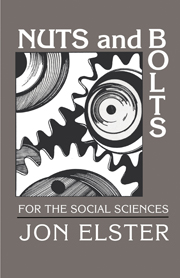Book contents
- Frontmatter
- Contents
- Preface and Acknowledgments
- Part One Introduction
- Part Two Human Action
- II Desires and Opportunities
- III Rational Choice
- IV When Rationality Fails
- V Myopia and Foresight
- VI Selfishness and Altruism
- VII Emotions
- VIII Natural and Social Selection
- IX Reinforcement
- Part Three Interaction
- Bibliographical Essay
- Index
II - Desires and Opportunities
Published online by Cambridge University Press: 05 June 2012
- Frontmatter
- Contents
- Preface and Acknowledgments
- Part One Introduction
- Part Two Human Action
- II Desires and Opportunities
- III Rational Choice
- IV When Rationality Fails
- V Myopia and Foresight
- VI Selfishness and Altruism
- VII Emotions
- VIII Natural and Social Selection
- IX Reinforcement
- Part Three Interaction
- Bibliographical Essay
- Index
Summary
THE elementary unit of social life is the individual human action. To explain social institutions and social change is to show how they arise as the result of the action and interaction of individuals. This view, often referred to as methodological individualism, is in my view trivially true. Many think differently, however, and some of their arguments will be addressed in chapter XV. Here I want to stress that individual actions are themselves in need of explanation.
A simple scheme for explaining an action is to see it as the end result of two successive filtering operations. We begin with a large set of all abstractly possible actions that an individual might undertake. The first filter is made up of all the physical, economic, legal and psychological constraints that the individual faces. The actions consistent with these constraints form his opportunity set. The second filter is a mechanism that determines which action within the opportunity set will actually be carried out. In this exposition the main mechanisms to be considered are rational choice (chapter III) and social norms (chapter XII). Here I shall concentrate on choice-generated mechanisms, mainly for ease of exposition but also because I believe they are more fundamental than norm-generated ones.
- Type
- Chapter
- Information
- Nuts and Bolts for the Social Sciences , pp. 13 - 21Publisher: Cambridge University PressPrint publication year: 1989
- 2
- Cited by



